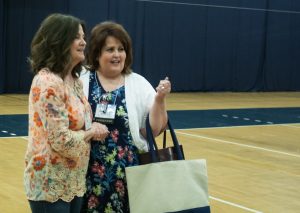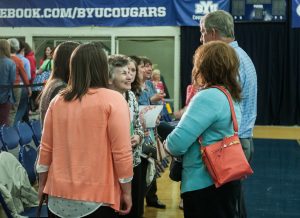
Stephanie Hagen and Gaylamarie Rosenberg taught women to love themselves during the 2016 Women’s Conference.
Hagen, a counselor in a stake Young Women presidency and former ward Young Women president, said she experienced feelings of self-doubt and negativity leading up to Women’s Conference. However, she was able to overcome these feelings as the Savior was by her side encouraging her.
Growing up, Hagen was overweight and was the victim of hurtful bullying.
“As I hit my teenage years … my life became particularly difficult,” Hagen said.
Hagen’s older brother “tortured” her with name-calling and insensitive jokes. Hallways at school were an obstacle course for her, a place where she was body slammed against lockers and jeered at.
“Have you ever heard the saying ‘Sticks and stones may break my bones, but words will never hurt me?'” Hagen said. “Do we believe that’s true? We know words hurt us to our core.”
Hagen’s parents sent her to BYU one summer to attend Thinderella, which Hagen refers to as the “Fat Farm.” She lost 30 pounds, but was still plagued with feelings of inadequacy and self-hatred.
“How could anyone feel good about themselves living in my shoes? How could anyone love themselves?” Hagen said.
The self-help books and weight-loss programs didn’t help her; nothing taught her that she was enough the way she was. But once in the Young Women’s program, Hagen developed a testimony that helped her through the difficult time.

“I had a very simple but very important testimony,” Hagen said. “And that was that my Heavenly Father loved me and that I had a Savior who was aware of me and my aching heart.”
A vulnerable Hagen read from her journal she kept during those years. To laughter from the audience and herself, Hagen detailed stories of being best friends with Butch, the popular and attractive quarterback on the school football team. However, as her journal revealed, she believed herself to be in love with Butch’s friend, Dave.
Hagen asked Dave to a school dance, which he rudely declined. For someone who believed happiness was only attainable for thin people who had boyfriends, this experience scarred Hagen.
Today, Hagen is happily married to Butch and they’re good friends with Dave and his family. Hagen had to forgive Dave, and Dave had to recognize the hurt he caused a teenage girl. Dave now plays immensely influential roles in the lives of Hagen’s daughters, Hagen said.
“The power for me to find happiness is in me,” Hagen said. “That’s a pretty simple statement … Happiness in the way that we feel about ourselves is a decision.”
But Hagen’s honest and humorous stories aren’t just for people who have with body-image problems.
“This is not a story about a weight problem,” Hagen said. “This is a story about anything in your life that makes you think you are less.”

Following Hagan was Gaylamarie Rosenberg, who has a master’s degree in family studies and is an adjunct faculty member in BYU’s church history and doctrine department. Rosenberg focused on how charity is applicable to self just as much as it is to others.
“Charity is the mirror that reflects others and ourselves correctly,” Rosenberg said. “Often we hear the word charity exclusively used (to refer to) a neighbor.”
Rosenberg said people wouldn’t ever give a friend or child a list of that friend’s or child’s flaws, and she asked why so often people make those lists about themselves. People must learn to love themselves with their flaws, she said.
Four years ago, Rosenberg’s mother had a massive stroke. Despite people not understanding her speech, Rosenberg’s mother is happy, serves and finds joy with others. Love, Rosenberg’s mother believes, is much more powerful than words.
“It is very difficult to love thyself as thy neighbor if you’re down in the dumps because we don’t like our life and wish we had the life of our neighbor,” Rosenberg said.
As people develop charity, they’ll gain more love for themselves as well as their neighbors, she said.
“I testify that Christ’s charity empowers us to love ourselves as we love our neighbor,” Rosenberg said. “As we partake of this love and divine charitable attributes, we will reflect his image in our countenance … (Charity) gives us hope that when we offer our best, it is enough … And it opens our eyes to divine assistance.”




